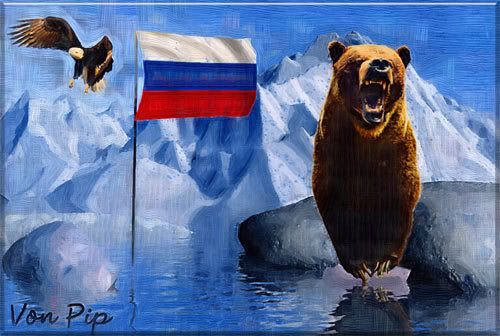
Few people realize, though why would they, that the Russian Scientific community really has never expressed much support for the whole global warming idea, at least as it has to do with CO2.
In fact the former Vice Chair of the IPCC Yuri Izrael, I guess he is now former, is very skeptical of all the alarmism "I think the panic over global warming is totally unjustified. There is no serious threat to the climate," In fact he was a speaker at the "skeptics conference" (International Conference on Climate Change) last year in NY. Which is coming up again in March.
I ran across this article and actually quite a few more about the Russians and their attitude towards the whole AGW thing. A few quotes from it:
“The Kyoto theorists have put the cart before the horse,” says renowned Russian geographer Andrei Kapitsa. “It is global warming that triggers higher levels of carbon dioxide in the atmosphere, not the other way round.”
Andrei Kapitsa by the way is the guy who discovered the Volstock Lake in Antarctica where the famous ice core comes from. He goes on to say:
<“We found that the level of CO2 had fluctuated greatly over the period but at any given time increases in air temperature preceded higher concentrations of CO2,” says academician Kapitsa, who worked in Antarctica for many years. Russian studies showed that throughout history, CO2 levels in the air rose 500 to 600 years after the climate warmed up. Therefore, higher concentrations of greenhouse gases registered today are the result, not the cause, of global warming.
a few other quotes from Russian Scientist in several fields.
Oleg Sorokhtin of the Russian Academy of Sciences Institute of Ocean Studies, and many other Russian scientists maintain that global climate depends predominantly on natural factors,....
.....“There were periods in the history of the Earth when CO2 levels were a million times higher than today, and life continued to evolve quite successfully,” agrees Vladimir Arutyunov of the Russian Academy of Sciences Institute of Chemical Physics......
....“The Kyoto Protocol is a huge waste of money,” says Dr. Sorokhtin. “The Earth’s atmosphere has built-in regulatory mechanisms that moderate climate changes. When temperatures rise, ocean water evaporation increases, denser clouds stop solar rays and surface temperatures decline.”....
....“Ecological treaties should seek to curb emissions of sulpher dioxide, nitrogen oxides, heavy metals and other highly-toxic pollutants instead of targeting carbon dioxide, which is a non-toxic gas whose impact on global warming has not been proved,” says Dr. Golubchikov.
Of course you do not hear too much about the Russians opposing views in the Western Press even though there are plenty of articles published in their press and journals about it.
Dr. Habibullo I. Abdussamatov whom I discuss in my main post above, even has some sort of experiment on the International Space Station that is being used to prove global cooling!
Because of the scientific significance of this period of global cooling that we're about to enter, the Russian and Ukrainian space agencies, under Dr. Abdussamatov's leadership, have launched a joint project to determine the time and extent of the global cooling at mid-century. The project, dubbed Astrometry and given priority space-experiment status on the Russian portion of the International Space Station, will marshal the resources of spacecraft manufacturer Energia, several Russian research and production centers, and the main observatory of Ukraine's Academy of Sciences. By late next year, scientific equipment will have been installed in a space-station module and by early 2009, Dr. Abdussamatov's space team will be conducting a regular survey of the sun.
CV OF A DENIER:
Habibullo Abdussamatov, born in Samarkand in Uzbekistan in 1940, graduated from Samarkand University in 1962 as a physicist and a mathematician. He earned his doctorate at Pulkovo Observatory and the University of Leningrad.
He is the head of the space research laboratory of the Russian Academies of Sciences' Pulkovo Observatory and of the International Space Station's Astrometry project, a long-term joint scientific research project of the Russian and Ukranian space agencies.
No comments:
Post a Comment